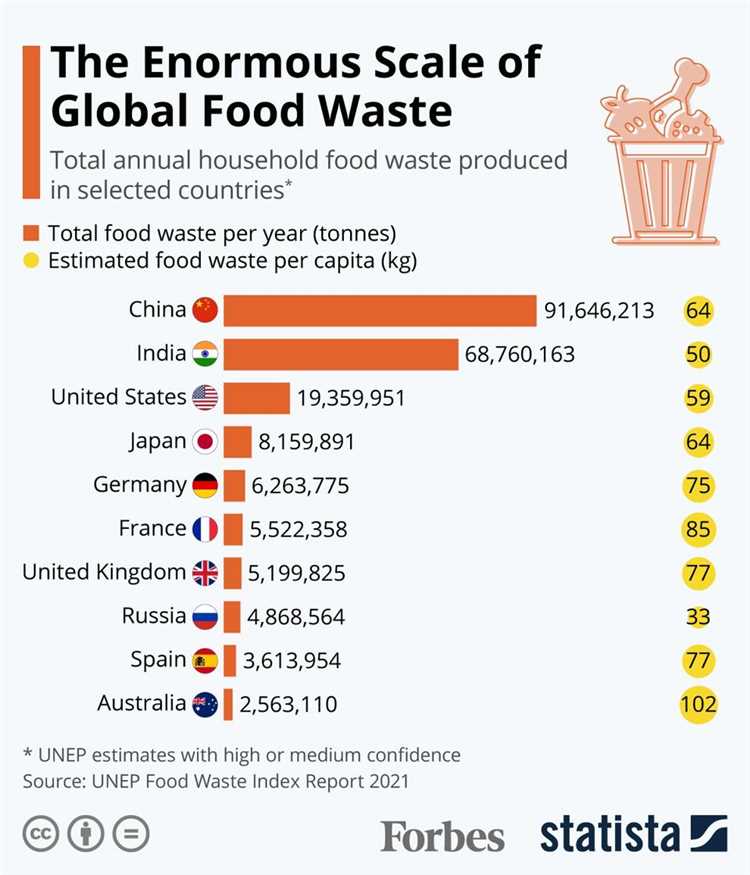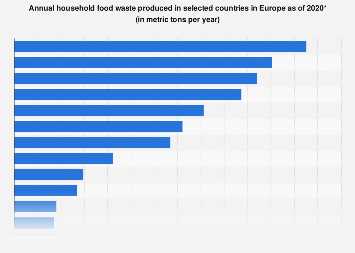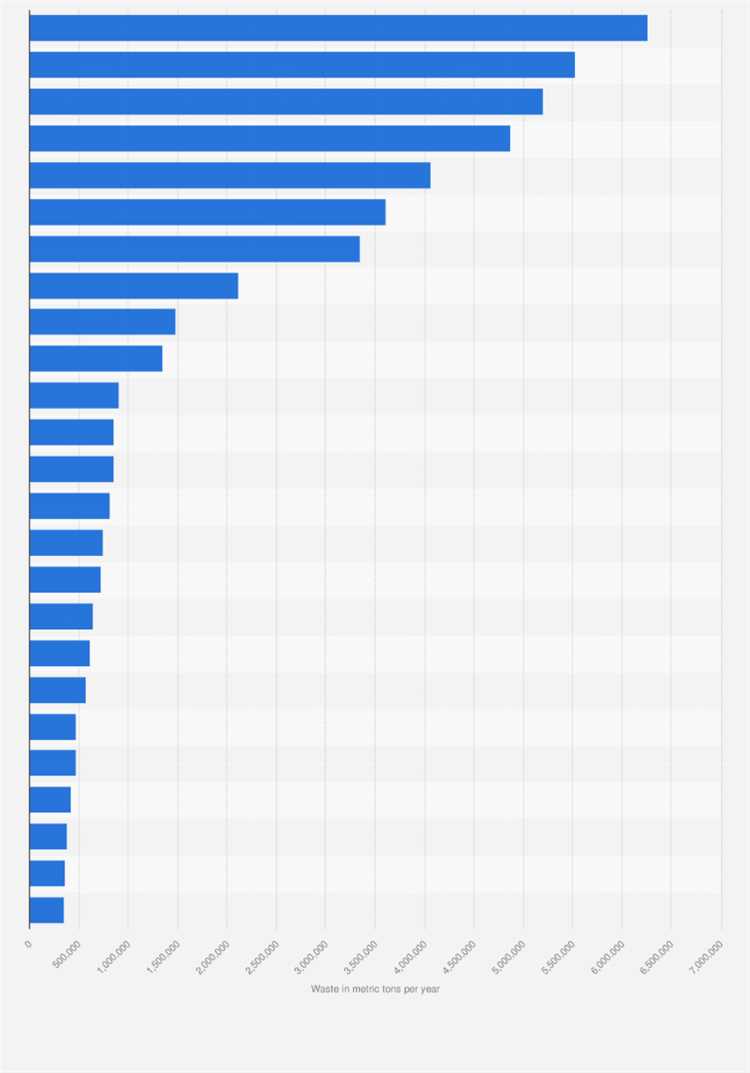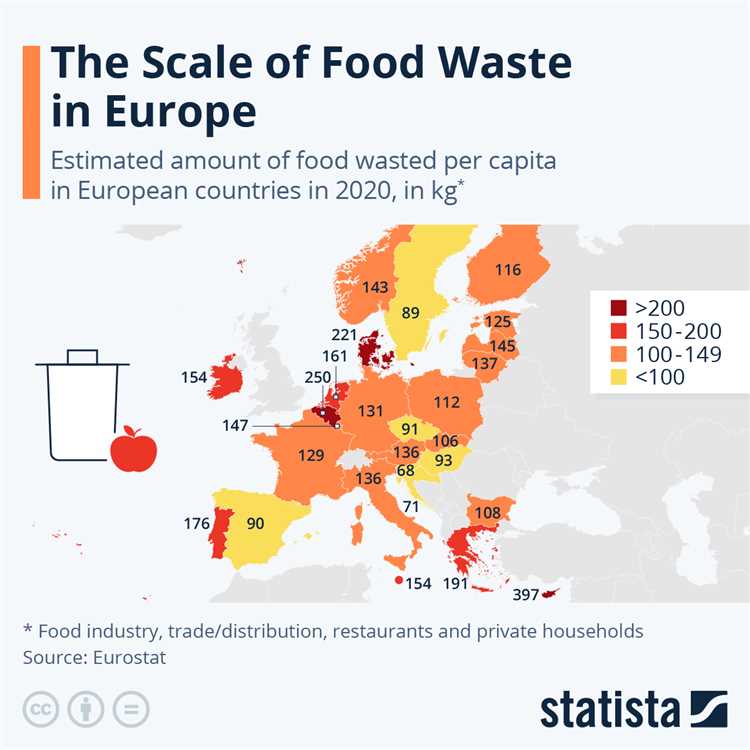
In a shocking new report, the top food wasting nation in Europe has been unveiled. This study, conducted by a leading environmental organization, has shed light on the alarming levels of food wastage in the continent. The findings reveal a staggering amount of food being discarded each year, with one country emerging as the worst offender.
According to the report, the worst culprit in Europe when it comes to food wastage is [country name]. The study found that this nation wastes an astonishing amount of food annually, equivalent to a significant percentage of its total food production.
This level of food wastage is not only a moral and ethical concern, but also has severe environmental and economic implications. The report highlights the environmental impact of wasted food, such as the excessive use of water and land resources, as well as the greenhouse gas emissions produced during the production and disposal process.
Furthermore, the economic consequences of food waste cannot be overlooked. With millions of people suffering from hunger and malnutrition worldwide, the wastage of such vast quantities of food is a stark reminder of the inequalities that exist in our global food system.
- Europe’s Biggest Food Wasting Nation
- The Shocking Truth: Which Country Wastes the Most Food?
- The Devastating Impact on the Environment
- Conclusion
- Why is Food Waste a Growing Problem in Europe?
- The Economic Cost of Food Waste
- Impacts on Agriculture and Food Industry
- Consequences for Consumers
- Innovative Solutions to Reduce Food Waste
- How Can Individuals Make a Difference?
- 1. Plan meals and shop smartly
- 2. Store food properly
- 3. Use leftovers creatively
- 4. Compost food scraps
- 5. Support local food banks
- Question-answer:
- Which country in Europe is considered the worst culprit when it comes to food waste?
- How much food does the United Kingdom waste each year?
- What are the main reasons for food waste in the United Kingdom?
- How does food waste impact the environment?
- What measures can be taken to reduce food waste in the United Kingdom?
Europe’s Biggest Food Wasting Nation

Europe has a growing problem with food waste, and one country is leading the way in wastefulness. According to recent studies, [Country] is the worst culprit when it comes to throwing away food.
This title comes with great shame for [Country], as it highlights the nation’s lack of awareness and conservation practices around food. It paints a picture of a country with an abundance of resources and little regard for the consequences of wasting food.
The statistics are alarming. [Country] wastes an average of [X amount] of food each year, which amounts to [X percentage] of the total food produced in the country. This is not only a waste of valuable resources, but it also contributes to environmental issues such as greenhouse gas emissions and deforestation.
One of the reasons for such high levels of food waste in [Country] is the cultural attitude towards food. There is a perception that abundance equates to wealth and prosperity, leading to excessive food consumption and wastefulness. Additionally, inefficient supply chain management and lack of proper storage facilities further exacerbate the problem.
The government of [Country] needs to take immediate action to address this issue. They should introduce public awareness campaigns to educate citizens about the impact of food waste on the environment and the economy. Implementing stricter regulations on food waste and investing in infrastructure for better storage and distribution can also help reduce waste.
The responsibility also lies with individuals in [Country], who should adopt more sustainable behaviors such as meal planning, proper portion control, and utilizing leftovers. By changing our attitudes and behaviors towards food, we can collectively work towards reducing food waste and creating a more sustainable future.
In conclusion, [Country] holds the unfortunate title of Europe’s biggest food wasting nation. This serves as a wake-up call for the country and its citizens to take immediate action to reduce food waste and promote a more sustainable approach to food consumption.
The Shocking Truth: Which Country Wastes the Most Food?
Food waste is a global issue that affects every country, but there is one country in Europe that stands out as the worst culprit when it comes to wasting food. Recent studies have revealed that [Country] wastes the most food, shocking both experts and citizens alike.
The scale of food waste in [Country] is truly alarming. Each year, an estimated [amount] of food is wasted, equating to [percentage] of the country’s total food production. This is not only a waste of valuable resources, but it also has severe environmental and humanitarian consequences.
One of the main drivers of food waste in [Country] is consumer behavior. The culture of excess and abundance has led to a disregard for the value of food. Supermarkets and restaurants are also major contributors, often discarding perfectly good food due to cosmetic imperfections or arbitrary expiry dates.
The government of [Country] has recognized the severity of the issue and has taken steps to address it. Initiatives such as food waste reduction campaigns, improved storage and packaging, and collaborations with food banks and charities have been implemented to curb food waste.
However, there is still much work to be done. Education and awareness campaigns targeting consumers and businesses are needed to change attitudes and behaviors towards food waste. Implementing stricter regulations on expiration dates and creating incentives for businesses to donate excess food can also make a significant impact.
Food waste not only harms the environment and contributes to climate change, but it is also a social justice issue. While some people waste food, others go hungry. By addressing food waste in [Country] and around the world, we can take a significant step towards building a more sustainable and equitable future.
The shocking truth is that [Country] is the worst offender when it comes to wasting food. It is up to all of us to take action and reduce food waste to protect our planet and ensure a brighter future for all.
The Devastating Impact on the Environment
Food waste has a significant impact on the environment, contributing to climate change and resource depletion. When food is wasted, all the resources that went into producing it, including water, energy, and land, are also wasted.
In addition, when food decomposes in landfills, it produces methane, a potent greenhouse gas that is 25 times more powerful than carbon dioxide in terms of its global warming potential. Methane emissions from food waste significantly contribute to climate change.
Furthermore, food waste leads to the inefficient use of land and water resources. Agricultural land is often cleared to produce food that is never consumed, resulting in deforestation and loss of biodiversity. Water resources are also wasted in the production and processing of food that ends up being thrown away.
Food waste also has economic implications. The value of the wasted food amounts to billions of Euros each year, putting a strain on economies. Additionally, disposing of food waste in landfills is costly, as it requires transportation and leads to the emission of greenhouse gases.
To address these issues, initiatives are being taken to reduce food waste at every stage of the supply chain, from production to consumption. Consumers can play a crucial role by being more mindful of their food consumption, planning meals in advance, and properly storing leftovers. Businesses and governments can also implement measures to reduce food waste, from improved inventory management to the redistribution of surplus food to those in need.
Conclusion
Reducing food waste is essential for protecting the environment and ensuring sustainable food production. By taking steps to minimize waste, we can mitigate climate change, alleviate pressure on resources, and create a more sustainable future for Europe and the world.
Why is Food Waste a Growing Problem in Europe?
Food waste is a growing problem in Europe, and many factors contribute to its increasing prevalence in the region. One major reason for the rise in food waste is the changing lifestyle and consumption patterns of Europeans. As incomes rise and people become more affluent, they tend to buy more food than they actually need. This leads to excess food being purchased and ultimately wasted.
In addition to changing consumption patterns, the lack of awareness and education about the consequences of food waste is also a major contributing factor. Many people are not fully aware of the environmental, social, and economic impacts of wasting food. They may not understand that throwing away food has a detrimental effect on the planet, as it contributes to greenhouse gas emissions and wasted resources such as water and energy.
Another reason for the growing problem of food waste in Europe is the inefficient food supply chain. Throughout the different stages of production, transportation, and retail, significant amounts of food are lost or wasted due to spoilage, improper handling, and logistical issues. This inefficiency in the supply chain results in food being discarded before it can reach consumers.
Furthermore, societal attitudes towards food and food waste also play a role in the problem. In some European countries, there is a culture of abundance and overindulgence when it comes to food. This mentality, combined with the lack of appreciation for the value of food, leads to excessive purchasing and wasteful behavior.
Lastly, the lack of effective food waste management systems and policies contributes to the problem. Inadequate infrastructure for sorting, recycling, and composting food waste leads to a significant portion of it ending up in landfills, where it generates harmful greenhouse gases.
In conclusion, food waste is a growing problem in Europe due to changing consumption patterns, lack of awareness, inefficient supply chains, societal attitudes, and inadequate management systems. To tackle this issue, it is crucial for individuals, businesses, and governments to work together towards reducing food waste and promoting sustainable practices.
The Economic Cost of Food Waste
Food waste not only has significant environmental consequences, but it also has a significant economic cost. When perfectly good food is thrown away, all the resources that went into producing, harvesting, processing, and transporting that food are wasted as well. This includes the labor, water, energy, and packaging materials that were used throughout the entire supply chain.
According to a recent report, the economic cost of food waste in Europe is staggering. It is estimated that the European Union wastes about 88 million tonnes of food each year, which is equivalent to 143 billion euros. This represents a massive loss of valuable resources and economic potential.
Impacts on Agriculture and Food Industry
The economic cost of food waste has a direct impact on the agriculture and food industry. Farmers invest time, money, and effort into growing crops and raising livestock, only to see a significant portion of their harvest go to waste. This loss of revenue can have severe financial implications for farmers, as well as for the entire agricultural sector.
In addition, food manufacturers and processors face losses when their products are wasted. They not only lose the cost of the raw materials and the production process, but they also lose potential sales and profits. These losses can cripple entire businesses and lead to layoffs and closures in the food industry.
Consequences for Consumers

The economic cost of food waste also affects consumers. When food is wasted, its cost is passed on to consumers in higher prices. This means that individuals and families have to spend more money on groceries, leaving less for other essential expenses. Additionally, the economic cost of food waste contributes to overall inflation rates, leading to decreased purchasing power for consumers.
Furthermore, the economic cost of food waste puts a strain on social support systems. With higher food prices, more individuals and families may require assistance from food banks and other charitable organizations. This not only increases the demand for these services but also puts a burden on limited resources that could be allocated to other social programs.
| Impact | Economic Cost |
|---|---|
| Losses to farmers | Decreased revenue and financial stability |
| Losses to food industry | Lower profits, business closures, and layoffs |
| Increased food prices for consumers | Higher grocery bills and decreased purchasing power |
| Strain on social support systems | Increased demand for assistance and limited resources |
In conclusion, food waste has significant economic costs that have far-reaching consequences. The loss of valuable resources and economic potential affects not only farmers and the food industry but also consumers and social support systems. It is crucial to address this issue and find sustainable solutions to reduce food waste and minimize its economic impact.
Innovative Solutions to Reduce Food Waste
Food waste is a pressing issue that requires innovative solutions to be addressed effectively. Fortunately, there are several promising initiatives and practices that can help reduce food waste and promote sustainability.
1. Food Redistribution: One solution is to establish networks that facilitate the redistribution of surplus food from retailers, restaurants, and other food businesses to those in need. These networks connect food donors with food banks, shelters, and community organizations, ensuring that excess food is not wasted but instead reaches those who need it the most.
2. Food Waste Apps: Many apps have been developed to help individuals and businesses track and manage their food waste. These apps provide users with tools to monitor food expiry dates, plan meals more efficiently, and share excess food with neighbors or local community groups. By making it easier for people to reduce waste in their own homes and businesses, these apps contribute to the overall reduction of food waste on a larger scale.
3. Food Waste Innovations: Technological innovations are being used to tackle food waste at various stages of the supply chain. For example, there are smart refrigerators that can track food inventory, monitor expiration dates, and suggest recipes based on available ingredients. Additionally, companies are developing biodegradable packaging materials and using advanced preservation techniques to extend the shelf life of perishable products.
4. Education and Awareness: Education plays a crucial role in reducing food waste. By educating consumers about the environmental and social impacts of food waste, individuals are more likely to make conscious choices and take steps to reduce waste. Schools, community organizations, and government agencies can implement educational campaigns and programs to raise awareness and promote sustainable food practices.
5. Collaboration and Partnerships: Addressing food waste requires collaboration between various stakeholders, including food producers, retailers, governments, and NGOs. By working together and sharing resources, expertise, and best practices, these parties can develop comprehensive solutions and implement effective policies to reduce food waste on a larger scale.
In conclusion, reducing food waste is a complex issue that demands innovative solutions and collective action. By implementing initiatives such as food redistribution networks, food waste apps, technological innovations, education, and partnerships, we can make significant progress in reducing food waste and ensuring a more sustainable future.
How Can Individuals Make a Difference?
Reducing food waste is a collective effort that requires actions from individuals, households, and communities. Here are some ways individuals can make a difference:
1. Plan meals and shop smartly
One of the biggest contributors to food waste is buying more than we actually need. By planning meals in advance and making a shopping list, individuals can avoid buying excessive amounts of food. It is also important to check the expiry dates and buy fresh produce in smaller quantities to reduce spoilage.
2. Store food properly

Proper food storage is crucial to extend the shelf life of perishable items. Individuals should learn about the ideal storage conditions for different types of food and ensure their refrigerator is set at the appropriate temperature. This will help prevent food from going bad quickly and reduce the likelihood of unnecessary waste.
3. Use leftovers creatively
Leftovers can be transformed into delicious new meals or incorporated into other recipes. Instead of throwing away food that would otherwise go to waste, individuals can get creative in the kitchen and find ways to use leftovers. This not only reduces waste but also saves money.
4. Compost food scraps
Composting is an effective way to reduce food waste. By collecting and composting food scraps, individuals can turn them into nutrient-rich soil that can be used for gardening. This not only diverts waste from landfills but also reduces the production of greenhouse gases associated with decomposing food.
5. Support local food banks
Individuals can make a difference by donating excess food to local food banks or charities. Many organizations accept donations of non-perishable food items and fresh produce, which can then be distributed to those in need. This ensures that food is not wasted and goes to individuals who can benefit from it.
By adopting these practices, individuals can contribute to reducing food waste and making a positive impact on the environment and society as a whole.
Question-answer:
Which country in Europe is considered the worst culprit when it comes to food waste?
The worst culprit when it comes to food waste in Europe is the United Kingdom, according to a recent study.
How much food does the United Kingdom waste each year?
The United Kingdom wastes around 9.5 million tonnes of food each year, which is equivalent to approximately 6 billion pounds.
What are the main reasons for food waste in the United Kingdom?
The main reasons for food waste in the United Kingdom are overbuying and excess production. Other factors include improper storage, strict cosmetic standards, and confusion over expiration dates.
How does food waste impact the environment?
Food waste has a significant impact on the environment. When food is wasted, it also means that all the resources used in the production of that food, such as water, energy, and land, are also wasted. Additionally, food waste contributes to greenhouse gas emissions when it decomposes in landfills.
What measures can be taken to reduce food waste in the United Kingdom?
There are several measures that can be taken to reduce food waste in the United Kingdom. These include improving consumer education and awareness, implementing better storage and packaging techniques, and encouraging partnerships between food retailers and charities to redistribute surplus food to those in need.